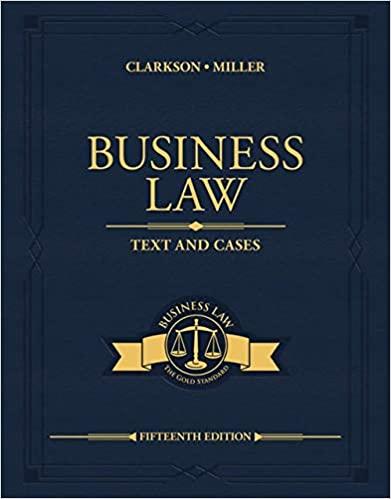Question
Problem 6-15: Can debtors use section 522(f) to avoid: GMAC's security interest in their car? A second mortgage on their home? Sears' security interest in
Problem 6-15: Can debtors use section 522(f) to avoid:
- GMAC's security interest in their car?
- A second mortgage on their home?
- Sears' security interest in all furniture that the debtors have purchased on credit from Sears?
Problem 6-16: In 2015, D filed a declaration of homestead with the Norfolk Registry of Deeds. In 2020, D filed for relief in the Bankruptcy Court pursuant to Chapter 7 of the Code. D resided in a non-opt-out state and elected the federal exemptions, which (currently) limits the homestead to $25,150.
The parties have stipulated that the fair market value of the residential property is $250,000. The property is subject to a mortgage to Randolph Savings Bank in the amount of $200,000 and a judgment lien in favor of Rockland Trust Company ("Rockland") in the amount of $65,000.
(a) D has filed a Motion to Avoid Lien pursuant to 11 U.S.C. 522(f)(1)(A), in which he asserted that the Rockland judgment lien impairs his exemption in his residence. What results?
(b) Would it make a difference if the Rockland lien attached to D's property simultaneous with D's acquisition of the property? Hint: "yes." See Marine Midland Bank v. Scarpino (In re Scarpino), 113 F.3d 338 (2d Cir. 1997). PLEASE REFERENCE THE CASE
(c) Now go back to the facts of Part (a) and suppose there is an additional judgment lien of $15,000 filed subsequent to the Rockland lien? What result?
(d) Does your answer to question (c) change at all if the $15,000 lien filed after the Rockland lien is a consensual mortgage?
Problem 6-17: Nickles has filed a Chapter 7 case. He resides in a home jointly owned by him and his ex-spouse, and that is subject to a mortgage with an outstanding principal balance of $50,000. Nickles also had a judgment recently entered against him in the amount of $15,000, arising out of an unpaid gambling debt to Epstein. Prior to Nickles's filing, Epstein recorded a lien against Nickles's house based on the judgment. Nickles listed the value of his residence as $100,000, and his interest in it as $50,000. He has also claimed a $20,000 homestead exemption per applicable state law. Nickles has moved to avoid Epstein's entire lien under section 522(f) on the ground that the impairment is more than the amount of the lien: (mortgage ($50,000) + exemption ($20,000) + challenged lien ($15,000) = $85,000 - value of debtor's interest in the property ($50,000) = $35,000). If you represent Epstein how will you challenge Nickles's calculation under section 522() (2)? See Sandoval v. Taylor (n re Taylor), 899 F.3d 1126 (10th Cir. 2018). PLEASE REFERENCE THE CASE
Problem 6-18: Ponoroff is a life-long resident of Florida. He owns a home with a current value of $300,000, which is subject to a first mortgage lien of $345,000, and a second mortgage in the amount of $50,000. Ponoroff has had some extraordinary expenses arising out of litigation with Markell over royalties. Because he wants to keep his house, Ponoroff files chapter 13. In his list of exempt property filed with his petition Ponoroff does not list an exemption for his residence. He does, however, (i) strip-off the second mortgage as an unsecured claim under section 1322(b)(2), and (ii) claims $4,000 in personal property exemptions based on a Florida statute that permits a wildcard exemption in that amount for debtors who do not receive the benefit of a homestead exemption. The Chapter 13 trustee has objected to this exemption on the ground that Ponoroff, by retaining and residing in his home, is receiving the benefit of the homestead exemption even thought he has not claimed it. Thus, the trustee contends Ponoroff cannot use the state wildcard provision. Who should prevail on the trustee's objection? See Valone v. Waage (In re Valone) 784 F.3d 1398 (11th Cir. 2015). REFERENCE THE CASELAW
Problem 6-19: D files for Chapter 7 bankruptcy on September 9. On October 10, she incurs hospital bills of $10,000. On November 11, D obtains a discharge in her Chapter 7 bankruptcy case. Is the October 10 medical debt covered by the November 11 discharge? If not, what can D do? Cf. sections 707(a) ("may dismiss...only for cause") and 727(a)(8).
Problem 6-20: D is considering filing a Chapter 7 bankruptcy petition because he owes $10,000 for taxes for the current year, $200,000 on his educational loans, $3,000 for alimony, $10,000 for recent cash advances on his credit card, and $20,000 to Kia Motors Finance Co. for a fully loaded Kia Soul. Will Chapter 7 help D?
Step by Step Solution
There are 3 Steps involved in it
Step: 1

Get Instant Access to Expert-Tailored Solutions
See step-by-step solutions with expert insights and AI powered tools for academic success
Step: 2

Step: 3

Ace Your Homework with AI
Get the answers you need in no time with our AI-driven, step-by-step assistance
Get Started


